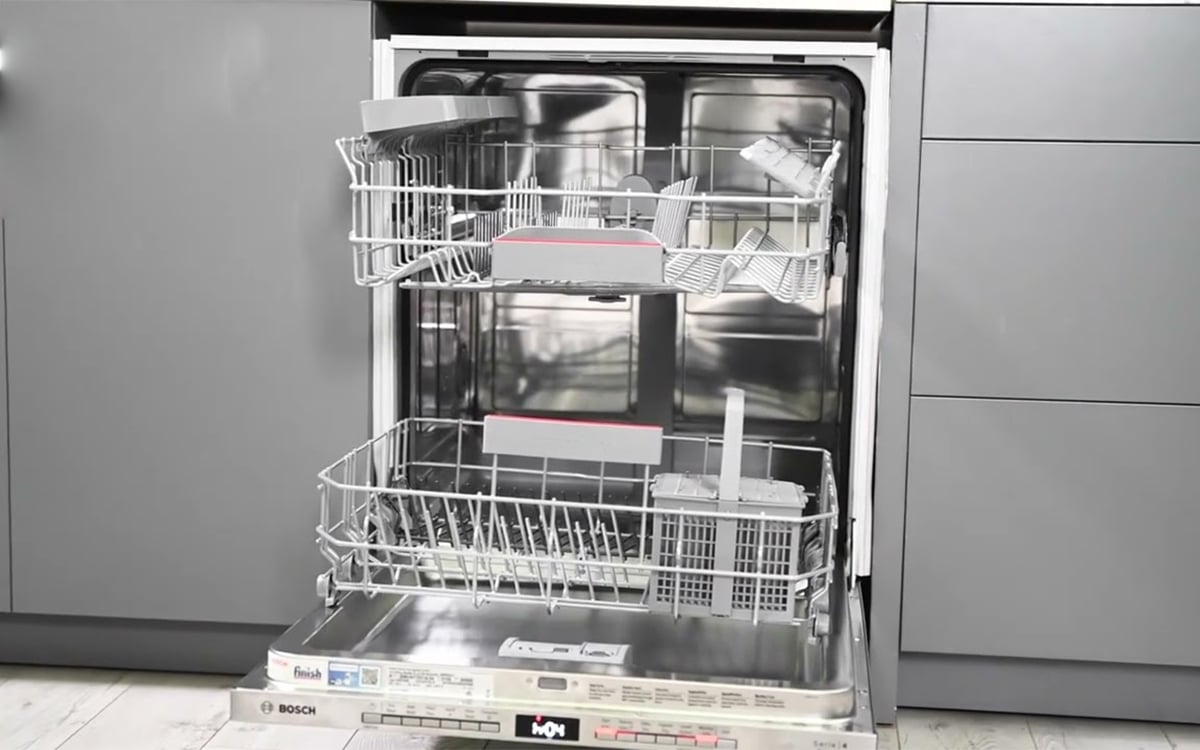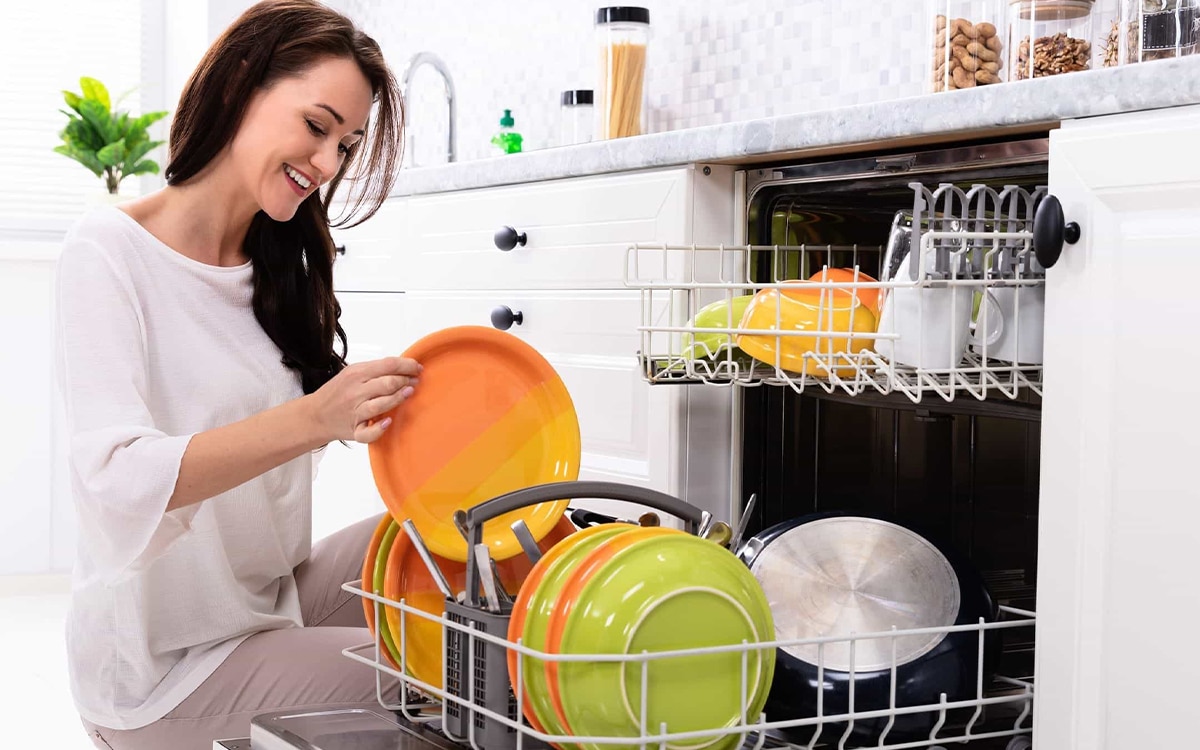Dishwashers have been around in some shape or form for more than 150 years! And of course, across those numerous years, they’ve changed and improved in a number of unique ways. Where dishwashers were once incredibly unwieldy and didn’t always clean dishes properly, they’re now far more efficient and accessible than ever.
But for as much as dishwashers have changed over the years, our habitual behaviours around using them have not! For as long as we’ve had dishwashers in our homes, we’ve been making sure to rinse our dishes before loading them. But now, leading manufacturers, such as Bosch, are suggesting that there’s now no need at all for the pre-cycle rinse! Is there actually any truth to this? Or is it certain to result in disaster?
Is it safe to put your dishes in the dishwasher without a rinse? And why does Bosch say you don’t need to do it? Join our Reliant tech experts down below to find out!
Why Does Bosch Recommend Not Rinsing Dishes?
Many modern Bosch dishwashers are now advertised with the promise that you don’t have to rinse your dishes before loading. This can leave many new owners feeling a bit hesitant, wondering whether it’s actually true.
Luckily, we can say for certain that many modern dishwashers genuinely do not require pre-rinsing before loading. There are a few reasons for this.
One reason, which has been previously stated by Bosch themselves, is that many modern detergents are designed to latch onto small pockets of food on your dishes. This means that if your dishes still have traces of pasta sauce on them, they’ll be more likely to be cleaned. When there’s not enough food left clinging to your dishes, it can actually result in a less effective clean!
Bosch recommends skipping the pre-rinse because it actually results in a better clean. Modern dishwasher detergents are formulated to latch onto pockets of leftover food. With less food, you end up with a less satisfying wash.
Another reason is that modern dishwashers are simply less likely to clog. In the past, early dishwashers were very easily hampered by grease and small pieces of food that found their way into the drains. Not rinsing your dishes meant putting your dishwasher at risk of blocking completely. Nowadays, modern dishwashers are designed to isolate the dirt from your dishes to keep it from clogging up your drains. So, you can load your dishes with confidence, knowing there’s no risk of an overload!
Finally, because modern dishwashers actually operate best when your dishes are slightly dirty, pre-rinsing them is actually a significant waste of water and electricity! If you want to cut down on your monthly bills, then skipping the pre-rinse is a great step!
Should You Leave Food On Dishes In The Dishwasher?
Now, while it’s a great idea to skip the pre-rinse before loading a modern dishwasher, this doesn’t mean you should load your dishes with reckless abandon! Despite now being capable of handling pockets of food, dishwashers still have certain limits.
If you still have larger pieces of food on your dishes, we would recommend not loading them right away. Instead, you should first scrape away large pieces of food into the bin. This helps to keep large pieces of food from clogging up your dishwasher and also uses no water or electricity.

Does it Cost Less To Wash Dishes By Hand?
Skipping the pre-rinse helps to minimise the amount of water and electricity used every time you load your dishwasher. Dishwashers have long had a reputation for consuming a lot of electricity and water, so it’s worth skipping the pre-rinse to save that little bit extra. However, you might wonder whether you could actually save even more by simply washing your dishes by hand.
It’s easy to assume that washing your dishes by hand saves more electricity than using a dishwasher. However, this isn’t always the case. If you often fill up your dishwasher to capacity each day, and you’re using the appliance frequently, then you might actually save more money using a dishwasher.
This is because dishwashers are designed to be more effective. A dishwasher can make full and effective use of every single drop of water. In order to wash a full dishwasher’s worth of dishes, by hand, you would use up more water, and more electricity to heat up that water! This is because you would constantly need to keep refreshing the water as you wash!
If you’re consistently making full use of your dishwasher, you can rest assured that it costs less to operate than to wash your dishes by hand. Dishwashers are now incredibly effective and can make the most of every drop.
However, if you live alone, or you only need to occasionally wash dishes, then it would be more effective to wash by hand. In order for a dishwasher to be truly efficient, it needs to be filled to capacity. If you don’t use enough dishes to fill up a dishwasher, then you are better off washing by hand!
Frequently Asked Questions
Why Does Bosch Say Not To Rinse Dishes?
Pre-rinsing your dishes before loading a dishwasher is now very archaic if using a modern dishwasher. Dishwashers are now more effective at carefully dealing with food waste. They’re less likely to be blocked, so pre-rinsing your dishes is simply a waste of water and electricity. Dishwasher detergents are also formulated to latch onto leftover food to start cleaning. Over-rinse your dishes, and you’ll have a less effective clean!
Is It Bad To Not Rinse Dishes?
Rinsing your dishes used to be essential for many years. This was because dishwashers were less equipped to deal with food waste. Now that they’re more effective it’s not risky to skip the pre-rinse. You should only pre-rinse your dishes if you’re using an older dishwasher. Especially one older than 10 years, as, at such an age, it may be more likely to be clogged!





